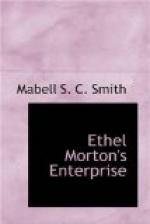“It is perfectly great to have you people here,” he said to Helen.
“Have you caught Emily?” she replied, dimpling with excitement.
“I have Emily traced backwards and forwards. Let’s go into the writing room of the hotel and you shall see right off how she stands.”
They gathered around the large table and listened to the account of the young lawyer’s adventures. He had had a lead that took him to Millsboro soon after he reached western Pennsylvania, but he missed the trail there and spent some time in hunting in surrounding towns before he came on the record in the Uniontown courthouse.
“I certainly thought I had caught her then,” he confessed. “I thought so until I compared the ages of the two Emilies. I found that our Emily would have been only ten years old at the time the Uniontown Emily married Edward Smith.”
“Mr. Clark wired you to find out just that point.”
“Did he? I never received the despatch. Hadn’t I told him the date of our Emily’s birth?
“He has a crow to pick with you over that.”
“Too bad. Well, I moseyed around some more, and the trail led me back to Millsboro again, where I ought to have found the solution in the first place if I had been more persevering. I came across an old woman in Millsboro who had been Emily Leonard’s bridesmaid when she married Julian Smith. That sent me off to the county seat and there I found it all set down in black and white;—Emily Leonard, adopted daughter of Asa Wentworth and daughter of Peter and Judith (Clark) Leonard. There was everything I wanted.”
“You knew she had been adopted by a Wentworth?”
“I found that out before I left Nebraska.”
“What was the date of the marriage?”
“1868. She was eighteen. Two years later her only child, a son, Leonard, was born, and she died—”
“Her son Leonard! Leonard Smith!” exclaimed Mrs. Morton suddenly. “Do you suppose—” she hesitated, looking at her father.
He raised his eyebrows doubtfully, then turning to Stanley he inquired:
“You didn’t find out what became of this Leonard Smith, did you?”
“I didn’t find any record of his marriage, but I met several men who used to know him. They said he became quite a distinguished musician, and that he married a Philadelphia woman.”
“Did they know her name?” asked Mrs. Morton, leaning forward eagerly.
“One of them said he thought it was Martin. Smith never came back here to live after he set forth to make his fortune, so they were a little hazy about his marriage and they didn’t know whether he was still alive.”
“The name wasn’t Morton, was it?”
The girls looked curiously at their mother, for she was crimson with excitement. Stanley could take them no farther, however.
“Father,” Mrs. Morton said to Mr. Emerson, as the young people chattered over Stanley’s discoveries, “I think I’d better send a telegram to Louise and ask her what her husband’s parents’ names were. Wouldn’t it be too strange if he should be the son of the lost Emily?”




